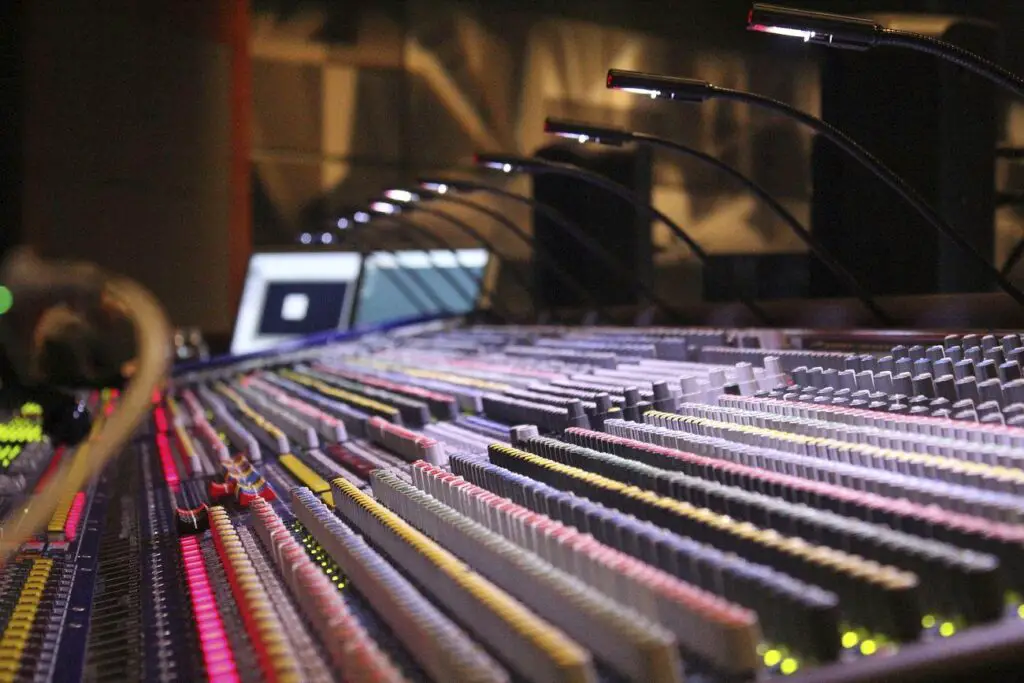Looking for a career in music production? Choosing the right school is the first step to success. But with so many options available, where do you begin? In this article, we’ll provide a list of schools with good music production programs, including information on each school’s program, faculty, facilities, and resources available to students. We’ll also discuss the admission requirements and application process, the various career opportunities available in music production, and tips for succeeding in music production programs. Whether you’re interested in audio engineering, music technology, or sound design, this guide will help you find the best music production program for your needs.
Table of Contents

Defining Good Music Production Programs
Before we dive into the list of top-ranked schools, let’s first define what makes a music production program good. A good music production program is one that not only teaches students the technical aspects of music production, but also provides them with the necessary skills to succeed in the industry. This includes a comprehensive curriculum that covers topics such as music theory, audio engineering, sound design, and music business.
In addition to a strong curriculum, good music production programs also provide students with ample opportunities for hands-on experience. This includes access to state-of-the-art equipment and facilities, such as recording studios, mixing consoles, and specialized software and hardware.
Another key component of good music production programs is experienced faculty members with industry connections. These faculty members should have a track record of producing successful alumni and be able to provide students with valuable insights and advice on how to succeed in the industry.
By choosing the right music production program, students can gain the skills, knowledge, and connections they need to pursue a successful career in music production. Now, let’s move on to the list of top-ranked schools for music production programs.

List of Top Music Production Schools
If you’re looking for a school that offers an outstanding music production program, then consider the following list of top schools in the US:
1. Berklee College of Music
Berklee College of Music is renowned for its comprehensive music production program. The program covers various topics, including music theory, audio engineering, production techniques, and digital audio workstation software. The faculty at Berklee includes award-winning producers, engineers, and musicians with years of industry experience. The school boasts state-of-the-art facilities, including recording studios, post-production suites, and a 400-seat performance center. Notable alumni include Quincy Jones, John Mayer, and Esperanza Spalding.
2. Full Sail University
Full Sail University offers a bachelor’s degree in music production that covers audio engineering, music theory, recording techniques, and music business. The faculty at Full Sail includes Grammy-winning producers and engineers with extensive industry experience. The school boasts world-class facilities, including recording studios, mixing studios, and post-production suites. Notable alumni include Gary Rizzo, who won an Academy Award for Best Sound Mixing for his work on the movie Inception.
3. University of Southern California
The University of Southern California (USC) offers a music production program through its Thornton School of Music. The program covers various topics, including music theory, audio engineering, music business, and film scoring. The faculty at USC includes award-winning composers, producers, and engineers with extensive industry experience. The school boasts state-of-the-art facilities, including recording studios, mixing studios, and post-production suites. Notable alumni include John Debney, who composed the music for the movie The Passion of the Christ.
4. New York University
New York University (NYU) offers a music technology program through its Steinhardt School of Culture, Education, and Human Development. The program covers various topics, including music theory, audio engineering, digital signal processing, and computer programming. The faculty at NYU includes award-winning composers, producers, and engineers with extensive industry experience. The school boasts state-of-the-art facilities, including recording studios, mixing studios, and post-production suites. Notable alumni include Dan Romer, who composed the music for the movie Beasts of the Southern Wild.
5. University of Miami
The University of Miami offers a music engineering program through its Frost School of Music. The program covers various topics, including audio engineering, music theory, music business, and music production. The faculty at the University of Miami includes award-winning producers, engineers, and musicians with extensive industry experience. The school boasts state-of-the-art facilities, including recording studios, mixing studios, and post-production suites. Notable alumni include Bruce Hornsby, who won a Grammy Award for Best New Artist in 1987.
When choosing a music production school, it’s essential to consider various factors, such as program offerings, faculty, facilities, resources available to students, and notable alumni. These top music production schools offer students the opportunity to learn from industry professionals, access to cutting-edge facilities and equipment, and a supportive community of music lovers.

Admission Requirements and Application Process
When applying to music production programs, students should expect to provide transcripts, test scores, essays, and letters of recommendation. The actual requirements may vary depending on the school, but a portfolio of their work or an audition may also be required. It is important to note that the application process for music production programs is highly competitive, and students should prepare a strong application that showcases their talent, passion, and potential for success in the industry.
Admission Requirements
Most music production programs require applicants to have a high school diploma or equivalent and submit transcripts from all previously attended schools. Some programs may also require students to have completed specific coursework in music or related fields. Test scores, such as the SAT or ACT, may also be required by some schools. Additionally, some schools may require letters of recommendation, an essay, or a personal statement as part of the application process.
Portfolio or Audition
Some schools may require a portfolio of work or an audition to assess a student’s skills and potential. A portfolio typically includes recordings of original music or sound design work, as well as any other relevant creative projects. Auditions may require students to perform live or demonstrate their skills in a studio setting.
Importance of a Strong Application
The music production industry is highly competitive, and schools look for students with exceptional talent and potential. Students should take the time to craft a strong application that showcases their skills, passion, and potential for success in the industry. This may include highlighting any relevant experience, such as internships or work in the industry, and demonstrating a strong understanding of music theory, production techniques, and software.

Careers in Music Production
The music production industry offers a variety of career opportunities, including audio engineer, music producer, sound designer, and studio manager. Each career path requires different skills and qualifications, but all involve working with music and sound in some capacity.
Audio Engineer
Audio engineers are responsible for recording, mixing, and mastering music and sound. They work with a variety of equipment, including microphones, mixing consoles, and digital audio workstations. Audio engineers may work in a variety of settings, including recording studios, live music venues, and television and film studios. The median salary for audio engineers is $53,330 per year, and the job outlook is projected to grow 9% from 2020 to 2030, faster than the average for all occupations.
Music Producer
Music producers oversee the creative process of music production, from songwriting to final mix. They work closely with musicians and songwriters to help them realize their creative vision and bring their music to life. Music producers may work in a variety of settings, including recording studios, record labels, and film and television studios. The median salary for music producers is $55,000 per year, and the job outlook is projected to grow 1% from 2020 to 2030, slower than the average for all occupations.
Sound Designer
Sound designers create sound effects and music for film, television, and video games. They work closely with directors, producers, and game developers to create sounds that enhance the visual and emotional impact of a production. Sound designers may work in a variety of settings, including post-production studios and video game development companies. The median salary for sound designers is $51,270 per year, and the job outlook is projected to grow 3% from 2020 to 2030, about as fast as the average for all occupations.
Studio Manager
Studio managers oversee the day-to-day operations of a recording studio. They are responsible for managing staff, maintaining equipment, and ensuring that productions run smoothly and efficiently. Studio managers may work in a variety of settings, including recording studios, radio stations, and television studios. The median salary for studio managers is $50,000 per year, and the job outlook is projected to grow 4% from 2020 to 2030, about as fast as the average for all occupations.
Some of the top employers in the music production industry include record labels, music studios, film studios, and video game companies. Notable success stories in the industry include Dr. Dre, who is a celebrated hip-hop producer and entrepreneur, and Hans Zimmer, who is a renowned film composer. Music production careers offer a wide range of opportunities for creative individuals who are passionate about music and sound.

What to Look for in a Good Music Production Program
Choosing the right music production program can be a daunting task. However, by considering the following factors, you can ensure that you are making an informed decision that will help you achieve your goals in the industry:
-
Experienced Faculty: It’s important to look for programs with faculty members who have extensive industry experience and connections. This can provide you with valuable insights and networking opportunities. Check the program’s website for information on their faculty and research their backgrounds to see if they align with your interests.
-
State-of-the-Art Facilities: The best music production programs will have access to state-of-the-art facilities, including recording studios, mixing studios, and post-production suites. Make sure to tour the facilities and see the equipment in person to ensure that it is up-to-date and in good condition. This will give you a sense of the program’s resources and the kind of technology you’ll be working with during your studies.
-
Hands-On Experience: Look for programs that provide hands-on experience in music production, including opportunities to work on real-world projects and collaborate with other students. This will give you practical experience in the field and help you build a strong portfolio of work to showcase to potential employers.
-
Comprehensive Curriculum: The curriculum should cover a wide range of topics, including music theory, audio engineering, production techniques, and digital audio workstation software. Look for programs that offer specialized courses in areas such as film scoring, sound design, and game audio if that’s the direction you want to go. A well-rounded curriculum will give you a broad understanding of the music production process and help you develop a range of skills that are in demand in the industry.
-
Successful Alumni: Look for programs with a track record of producing successful alumni in the music production industry. Research the career paths of past graduates and see if their experiences align with your goals. This will give you an idea of the kinds of opportunities available to you after graduation and the kinds of connections you can make through the program.
By considering these factors when researching music production programs, you can make an informed decision and choose a program that will set you up for success in the industry. Keep in mind that every program is different, so it’s important to do your research and find the one that’s the best fit for you and your career goals.

Specialized Areas of Study in Music Production Courses
Most music production programs cover the basics of audio engineering and production techniques. However, some programs offer specialized courses that cater to specific interests such as film scoring, sound design, and game audio. Here are some examples of specialized areas of study in music production:
1. Film Scoring
Film scoring courses teach students how to compose music for film and television. Students learn about the creative process of composing music that enhances the emotional impact of a scene. They also learn how to work with directors and other collaborators in the industry.
2. Sound Design
Sound design courses teach students how to create sound effects and music for different types of media, such as film, television, and video games. Students learn about the technical aspects of sound design, including recording and editing techniques, as well as the creative aspects of designing sound to enhance the overall experience for the viewer or player.
3. Game Audio
Game audio courses teach students how to create sound effects and music for video games. Students learn about the unique challenges of designing sound for interactive media, such as creating adaptive music that changes based on the player’s actions. They also learn how to work with game developers and designers to create a cohesive and immersive audio experience.
By choosing a music production program that offers specialized courses in your area of interest, you can gain the skills and knowledge necessary to pursue a career in that specific field. These courses can provide you with a competitive edge in the industry and help you stand out as a specialist in your field.

Music Production Facilities and Equipment
Music production facilities and equipment are essential components of any music production program. State-of-the-art facilities and equipment can provide students with hands-on experience and prepare them for the real-world challenges of the industry.
Recording Studios
Recording studios are the backbone of any music production program. They are equipped with the latest technology and software, including digital audio workstations, microphones, and sound processors. These studios provide students with a professional environment to record and produce high-quality audio. Students learn how to use the equipment and software in a real-world setting, preparing them for careers in the music production industry.
Mixing Studios
Mixing studios are used to mix and balance the various elements of a musical production, including vocals, instruments, and effects. Music production programs typically offer students access to a variety of mixing consoles, ranging from small analog mixers to large digital consoles. These studios provide students with the opportunity to develop their mixing skills and learn how to produce a polished final product.
Post-Production Suites
Post-production suites are used for editing and mastering audio. They are equipped with advanced software and hardware that allow students to manipulate audio in a variety of ways. Music production programs typically offer students access to a variety of post-production software, including industry-standard software like Pro Tools and Logic Pro. These suites provide students with the tools they need to produce a professional-quality final product.
Specialized Equipment
Some music production programs offer specialized equipment for film scoring, sound design, and game audio. These programs provide students with the opportunity to work with specialized equipment and software, preparing them for careers in these industries. Specialized equipment may include synthesizers, drum machines, and hardware effects processors. These tools allow students to create unique and innovative sounds that set their productions apart from the competition.
In conclusion, music production facilities and equipment are an integral part of any music production program. They provide students with hands-on experience and prepare them for careers in the music production industry.

Conclusion
In conclusion, selecting the right school is a crucial step for students interested in pursuing a career in music production. The top-ranked schools for music production programs offer comprehensive knowledge and hands-on experience, access to state-of-the-art facilities and equipment, and experienced faculty members with industry connections.
To choose the program that suits you best, research music production programs and consider factors such as faculty experience, facilities and equipment, and specialized areas of study. With hard work, dedication, and a passion for music production, students can achieve their dreams of a successful career in the music industry.
We hope this article has provided valuable insights into the top music production schools and what to expect from a music production program. For more information and resources on music education, check out our other articles.


